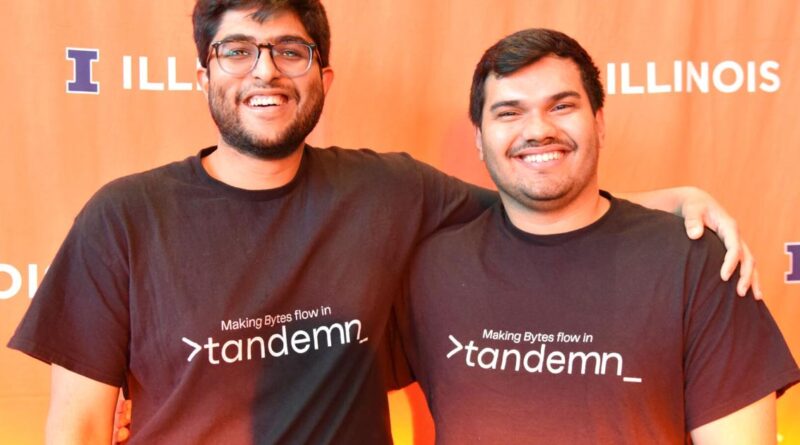Two start-ups take first at Cozad New Venture Challenge | Business

LEFT: Hetarth Chopra and Mankeerat Sidhu founded startup Tandemn. RIGHT: Brijesh Muthumanickam and Hannan Hussain founded Nora AI.

Brijesh Muthumanickam and Hannan Hussain founded Nora AI.
URBANA — For the first time in Cozad New Venture Challenge history, judges couldn’t just choose one winner: There was a tie for first place.
Two AI-focused startups each took home $60,000 — on top of any other grants they earned — to make their business goals a reality.
The Cozad challenge, put on each year since 2000 by the Grainger College of Engineering’s Technology Entrepreneur Center, allows student-led startups to pitch their businesses to industry professionals to earn funding and connections.
One, Tandemn, aims to put unused computer processing power toward running customizable large language model AI programs for individual companies.
The other, Nora AI, aims to enhance the hiring process for both employers and applicants.
Hetarth Chopra and Mankeerat Sidhu started working on Tandemn just six months ago and have already been working with their first customer.
They said their biggest challenge is funding … and keeping their grades up. Sidhu had to run after the Cozad award ceremony to get his homework done.
“We’re going to build this out in the next six months … and we plan to be across the world,” Sidhu said.
Chopra said Tandemn is extremely cutting-edge: the concept only has one legitimate competitor, which was just funded about a month ago.
Hannan Hussain and Brijesh Muthumanickam were inspired to create Nora AI after their own experience as both job-seekers and recruiters.
Both went through the process of applying to dozens of jobs only to be faced with loads of rejections — “We knew we weren’t that bad!” Hussain said — then later found themselves rejecting most applicants because they didn’t have time to interview them all.
The idea with Nora AI is that a recruiting company could subscribe to the program, customize interview questions and preferred employee qualifications, then send applicants a link to complete a 20- to 30-minute video interview with the large language model, which would then create a score and description for the applicant.
“It’s all about the fair chance,” Muthumanickam said.
There were six finalists for the 2025 Cozad competition, each of which received at least a small grant.
- kWh is in talks with politicians and businesses in India to create an energy marketplace to help reduce overloading the grid at peak electricity use hours, which can cause blackouts.
Rather than contacting customers to ask they reduce energy use in exchange for a reward when those peak hours approach, kWh’s software would allow customers to be rewarded for opting in to a program that automatically balances energy use throughout the day.
This could run on everything from thermostats to electric vehicle chargers, increasing grid capacity by about 20 percent.
- Sprout is in the process of developing a stent for the pulmonary valve that can expand and grow as children do, keeping blood flowing through their hearts as they age.
While the stent would still need to be placed surgically, it would prevent children from having to go through multiple open-heart surgeries over the years to size-up their stents.
The testing process for cardiac medical devices is long and rigorous, but Sprout’s team believes they can have their device in a human for the first time around 2030.
- Earlynosis is another AI-centric business pitch, centered around a wearable device that looks like the glucose monitors some people with diabetes wear on their arms.
This one instead detects sepsis in its extremely early stages, days before most patients would think to go to the doctor.
It could be prescribed to at-risk patients and save patients, doctors and insurance companies massive amounts of money; there are 1.7 million cases of sepsis annually in the U.S. and the average hospital stay for treatment is around nine days.
- Voca Health also uses AI, but on a device most people already have: a smartphone.
The app is designed for patients to use to track their vocal health over time, which can help determine if they need to seek treatment or if therapies are already working.
Around one in eight adults in the U.S. report voice problems and the current diagnostic process is mostly based on the patient’s subjective experience and a scope which goes through the nose; team leader Shreya Rangarajan described it as a COVID-19 test but worse.

